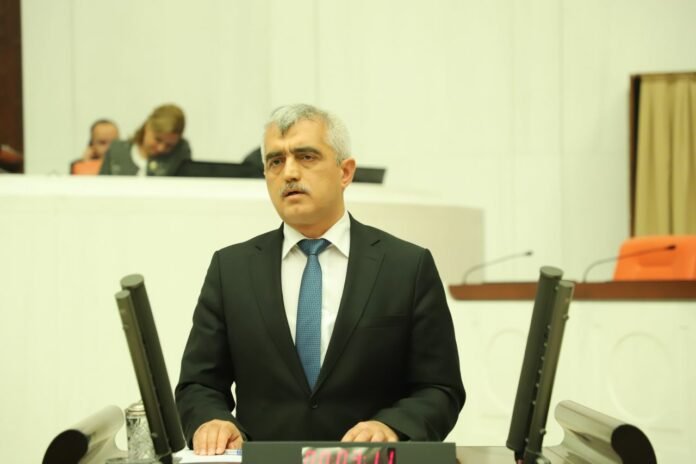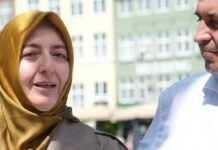A judge overseeing the trial of 14 high school girls and 27 others at an İstanbul courthouse expelled a lawmaker on Tuesday after the MP criticized the trial in which the defendants face terrorism charges for engaging in everyday activities such as socializing and living together in student housing, Turkish Minute reported.
The trial, which began on Monday, has garnered significant attention due to the unusual nature of the charges. The defendants, including 14 high school students aged between 13 and 17, are accused of terrorism-related activities, for engaging in everyday activities such as studying with peers, socializing and living together in student housing as part of a broader crackdown on alleged followers of the Gülen movement.
The movement has been labeled a terrorist organization by the Turkish government, although much of the international community and human rights organizations view the charges as politically motivated.
Ömer Faruk Gergerlioğlu, an MP from the pro-Kurdish Democracy and Equality Party (DEM Party) and a prominent human rights advocate, was ordered to leave the courtroom by Judge Şenol Kartal on Tuesday.
The incident occurred during the second day of the trial at the İstanbul 24th High Criminal Court, following a series of tweets posted by Gergerlioğlu the previous evening in which he criticized the court proceedings and the charges against the defendants.
Judge Kartal, upon entering the courtroom, addressed Gergerlioğlu, saying he had seen the MP’s tweets criticizing the trial when he checked social media the night before.
Kartal then demanded that Gergerlioğlu leave the courtroom immediately, citing the MP’s public remarks as the reason for his removal. “You criticized my conduct of the trial,” the judge said, referring to the tweets.
Speaking outside the courtroom, Gergerlioğlu expressed disbelief at being ejected from the hearing. “I was sitting quietly in the courtroom, observing the proceedings as a member of parliament,” he said. “The judge asked me to leave because he was upset about my tweets. Is this the state of justice in Turkey?”
The MP had tweeted about the absurd nature of the trial, where the teenage girls and their families face terrorism charges for actions as benign as ordering food online, playing soccer, attending iftar meals and going bowling.
“People are being punished for simply living their lives,” Gergerlioğlu tweeted. His posts quickly gained traction on social media, drawing widespread criticism of the Turkish judiciary’s handling of the case.
The indictment includes claims that the girls and their families were involved in illicit organizational activities, citing examples such as studying together, visiting shopping malls and participating in recreational activities like bowling.
He emphasized that his role as a member of parliament is to observe and report on legal proceedings, particularly in cases where human rights are at stake. “I will file a complaint with the Council of Judges and Prosecutors [HSK] about this judge,” Gergerlioğlu announced. “This is an unlawful trial, and the judge’s reaction to criticism only underscores the injustice happening in that courtroom.”
The trial, referred to in the Turkish media as the “High School Girls Case,” involves 41 defendants, including the high school students and their families. The defendants were detained in May 2024 as part of a broader crackdown on individuals allegedly linked to the Gülen movement, which the government claims orchestrated a coup attempt in 2016.
Critics of the trial point out the lack of evidence connecting the defendants to any terrorist activity, arguing that the charges are based on routine social interactions. The police operation that led to the arrests followed months of wiretapping and physical monitoring, during which the authorities tracked the movements and communications of the defendants. However, the evidence presented in court has been widely criticized as weak and based on assumptions.
During Monday’s hearing Judge Kartal asked the defendants questions such as “Why did your children play soccer together?” and “Why did your daughter attend iftar meals with her friends?” These questions, shared by Gergerlioğlu on social media, were met with disbelief by many observers, who viewed them as examples of the government’s attempt to criminalize normal social activities.
Since 2016, more than 700,000 people have been investigated on terrorism charges over their alleged ties to the Gülen movement, with tens of thousands detained, many without credible evidence of criminal wrongdoing.
Human rights organizations, both in Turkey and internationally, have condemned the Turkish government for using anti-terror laws to silence dissent and persecute political opponents. The European Court of Human Rights (ECHR) has repeatedly criticized Turkey’s misuse of its anti-terror laws, particularly Article 314 of the Turkish Penal Code, which criminalizes membership in an armed terrorist organization. The current trial, critics argue, is yet another example of the overreach of these laws.














